New Sheriff in Irontown
This is the third time Ironman's been sold. Valerie Silk treated Ironman like a favorite child and while World Triathlon Corporation didn't (its ownership tenure was marked by indecision and false starts — we're a licensing company; no, we're a race production company), WTC did make sure the brand was solvent and solid.
Providence Equity Partners was a good owner as private equity goes.
What about the new owners? The Chinese? It's a problem, my just putting it that way. I don't write about how Ironman was treated while the Caucasians were running it. Nevertheless, Ironman under "Chinese" ownership was a subtext to this year's race in Kona. While my media contemporaries were populating the international press event or the pro meeting I chose to go to the Chinese Media Press Conference, which took place entirely in Mandarin except for translation to English so that Ironman CEO Andrew Messick could answer questions from the Chinese press.
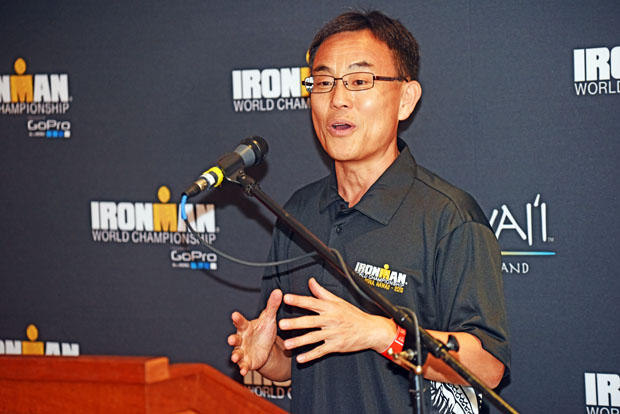
The press included financial reporters from China who may as well have been at the ribbon cutting ceremony of a new Dalian Wanda shopping center. But they were here, finding out about Wanda Group's newest property. I thought this is the place we're likely to get the truest answers to what Ironman's new owners have in mind.
On the subject of narrow preconceptions my first surprise was that the press corp from China consisted mostly of women, who were a tough crowd. No powder-puff questions. I was informed by Nimblewear's president, Jim Lin (pictured with Jack Gao and I), that in today's China there are a lot of professional women with heft and backbone. Note to self: Remember this.
Dalian Wanda has two divisions: Real Estate, and Cultural Industry. The top-2 in the org chart at Cultural Industry are Lincoln Zhang and Jack Gao, in that order. I asked Andrew Messick whether Lincoln Zhang had any intersection with sport at all. "Lincoln, Phillipe [Blatter, CEO of InFront, another Wanda company], and I have been swimming out to the coffee pontoon every morning."
Andrew's immediate boss is Jack Gao. He runs daily. Religiously. And looks it. Already the new owners are more psychically invested in Ironman, and the Ironman experience, than were those at PEP.
Jack Gao is fairly recent in his VP position at the Wanda Group, previously a movie financier. Before that, he was for several years head of News Corp in China. Before that he ran Microsoft in China for Bill Gates.
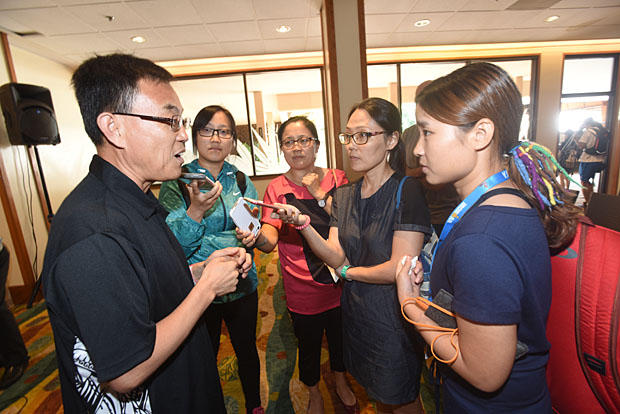
Before that, he led an initiative related to finite element analysis for a NASA project (he's got a PhD in engineering, earned at UCLA).
Jack Gao doesn't always drink beer. But when he does, he prefers Dos Equis.
Here are the questions I posed to Jack Gao in an effort to try to find out why the most dynamic industrial and entertainment group in Asia purchased the Ironman, and what it intends to do with it.
SLOWTWITCH: Is the play to leverage the Ironman brand inside of China – to place a wager on the disposable income of the Chinese middle class?
JACK GAO: Yes. China has undergone an enormous evolution over the last 30 years. Food, housing, clothing, traveling was the economy. We've now reached a point where entertainment – which barely existed as a part of the economy – has grown tremendously now that we have a sizable middle class. Film, entertainment, sport, almost from nothing is part of the economy. From a business perspective, macro-level, this industry will grow tremendously, with big year-over-year growth.
With economic development at a certain point peoples' lifestyles will change, to a healthy lifestyle. This will grow so fast. We won't need 30 or 50 years to figure this out. We'll learn from the West, and bypass the middle stage. Chinese people who never saw a TV, no black and white TV, their first TV is a color LCD big screen. A majority of Chinese people have never experienced a land line phone. Their first phone is this [holds up his handheld].
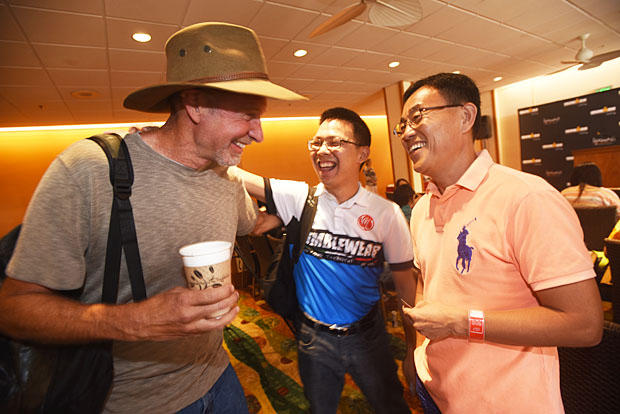
SLOWTWITCH: When you bought Ironman, in a way it was like when Wanda became the largest owner of movie screens worldwide, or when you decided to build a theme park or a movie studio, it's bringing culture, entertainment, lifestyle changes to the middle class.
JACK GAO: Yes. And this partnership. It's an honor for Wanda to be a partner of the WTC. Seriously. And we can learn a lot from Andrew joining the company. That's the good pressure for the Chinese folks. At the same time it's a development stage. In the last 30 years it's been foreign investment into China. Wanda is a large private sector developer in China, while it also invests internationally.
SLOWTWITCH: Ironman is a subversive activity. It gives someone the confidence he can do anything. Is the Chinese population more aligned, or less aligned, with the spirit of Ironman, or is everyone, at base, the same in how they approach the idea of Ironman in their personal lives?
JACK GAO: Chinese are no different than any population, it's just such a big population, with enormous numbers. We have 56 minorities, each with a different perspective, like all other countries.
Andrew brought me over to Zell am See, and it blew me away. Not just the competition, but the spirit. I tell everybody, that's why we brought more people [i.e., the Chinese press] over to see Kona.
SLOWTWITCH: I can see it. You're going to do one of these things.
JACK GAO: I need to try! Andrew told me I need at least 2 years to prepare. I feel this [Ironman] is going to be very inspiring to a lot of Chinese folks. We have a club now in Shanghai, with 200 serious members, they want 2000. One thing I know for sure, Ironman will have a very big presence in China. It's just a matter of how to do it, how to manage it, how to make it happen, to have more folks experience Ironman.
SLOWTWITCH: You have two divisions: Cultural Industry and Real Estate. If I was the race organizer of an Ironman in China the first thing I would do is walk over to someone in Real Estate and say, "I need help. I need permits. I need potholes filled, traffic control, barricades, crowd control." Do you expect Culture and Real Estate to work together to produce these events in cities across China? Or can Culture do this by itself?
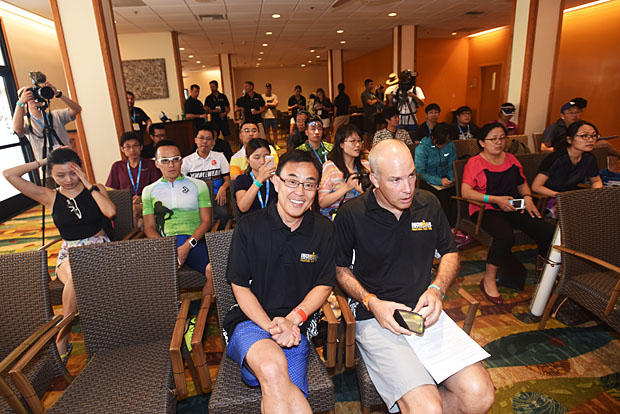
JACK GAO: The crowd that came over here is a good example. The crowd that came is about 43 people. They're a combination of the media; from corporate and the PR folks; local government representatives and the commercial property folks.
SLOWTWITCH: They're here? The commercial people are here too?
JACK GAO: Yeah. So that's already happening. Wanda is big. Over 100,000 employees. But in certain ways it's small. It's a very tight operation, and we have a very strong chairman. Wanda is my first company I experienced that is a local Chinese company. I used to work for Bill Gates and Murdoch. One thing stunned me: the way Wanda executes. They are the one to get things done. Especially for commercial properties and projects. We have a big mall opening every week. Everywhere in China. So far, to my knowledge, not even one project has been delayed a day. And that property, wherever it is, that place is going to boom.
As far as the Culture division, it has 4 baskets: sports, film, entertainment, tourism. Tourism is already the largest [tourist sector company] in China. The largest cluster of travel agencies, and the online, like Expedia.
SLOWTWITCH: Really? Your own version of Travelocity?
JACK GAO: Yeah, a company called Tongcheng, we're the controlling shareholder in the company.
So when you think about interaction and integration, there are lots of synergies, like providing tourism packages. The property folks have close to a hundred 5-star hotels, and shopping malls, it's the largest commercial interface with consumers in China.
SLOWTWITCH: Do you expect to place races in China where Chinese will travel to these races and tourism becomes a dynamic of the race, and the tourism focus inform the decisions of where to place the race? Or do you expect to place a race where most of the Chinese contestants will sleep in their own beds the night before the race? Can you answer that yet or is it too early?
JACK GAO: It's kind of early. This is our first appearance at Kona and Zell am See. What can we do in China? One thing is for sure: tourism in China is booming incredibly, domestically and internationally. Used to be tourism was taking a picture. Confidence is emerging.
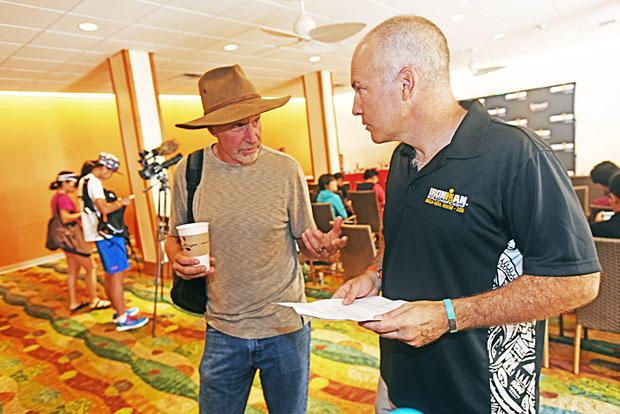
SLOWTWITCH: Like ecotourism, where you go somewhere to do something.
JACK GAO: Exactly. Like Ironman. I was in Zell am See. You have 1 athlete part of a family of 3 to come to Zell am See and when you ask the authorities they say the average stay is 8 days. The local community knew exactly what that meant. I'm almost certain, down the road, the sport-driven travel product will be a key component [of Ironman in China].
SLOWTWITCH: Ironman is exclusive in its use of the brand. We have Ironman, Ironman 70.3 and 5i50, but the 5i50 series, though owned by Ironman, did not bear the tradename Ironman. Ironman was very stingy with its tradename. Very protective. Will we expect to see 5k and 10k races with the Ironman name attached in China, or will the brand be used in China similarly to the way it is used worldwide?
JACK GAO: We will definitely follow whatever Andrew is doing. It's Andrew's call, we're in full support of Andrew in how the Ironman brand is run.
One challenge for us in China is Ironman being used for anything called triathlon. Ironman is a WTC brand but Ironman in Chinese is called Ironman Triathlon.
SLOWTWITCH: What you're saying is, if in China a person says he's going to do a triathlon…
JACK GAO: It's called an Ironman. It's the same word.
The good news is, Ironman is so popular, everybody knows Ironman. The challenge is that Ironman is used in a way WTC says it's not supposed to be used. That's what we need to figure out.


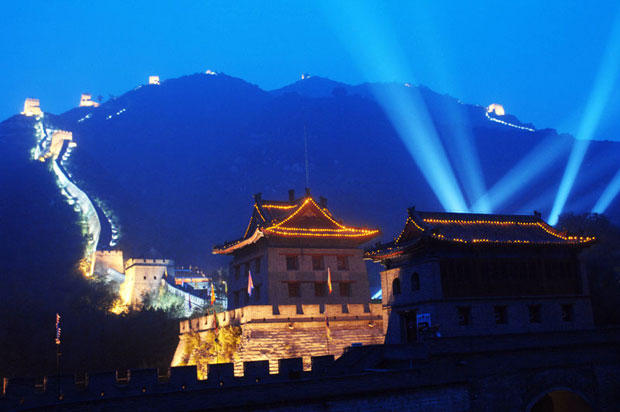
Start the discussion at slowtwitch.northend.network